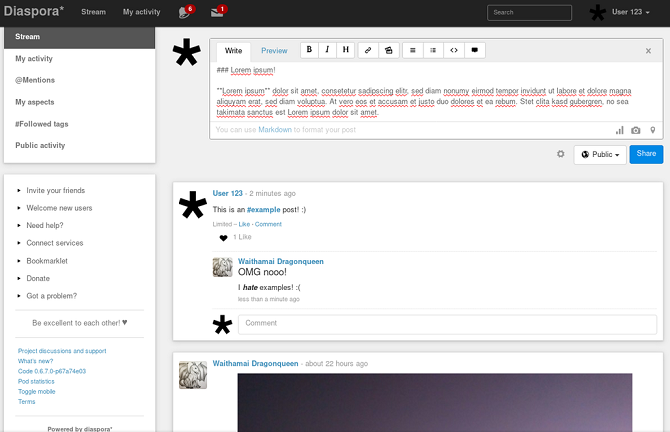Google+ is no more. After several years of underdevelopment, the consumer version of Google+ is shutting down on April 2, 2019.
This leaves a loyal fanbase looking for a new home. Google+ might never have been able to rival the likes of Facebook and Twitter, but it had some great features that aren't easily replicated elsewhere.
With that in mind, here are the best Google+ alternatives that you need to consider.
1. MeWe
There's a Google+ community called Google+ Mass Migration. It has almost 5,000 members, many of whom are the leaders of existing large Google+ communities that are looking for a new home.
The most common suggestion is MeWe. It is a privacy-focused network. There are no ads, no user tracking, and no data mining.
There are three types of group: Private (requires invite), Selective (approval needed to join), and Open. Each group has a chat (which is often unmoderated) which supports video and voice calls. MeWe also has its own version of staple Google+ features such as Circles and Collections. It also allows you to follow hashtags.
Uniquely in this list, MeWe comes closest to replicating Google+'s integration with Google Drive and Google Photos. All users get 8GB of free cloud space; you can upgrade it to 50GB for $4.99/month.
MeWe's MeWePRO service might tempt businesses that want to move away from Google+. It costs $75 per year, per employee, though it is free for educational and non-profit organizations.
2. Mastodon
Many Google+ users are keen to avoid the same fate befalling them for a second time. Because even the most prominent social networks aren't immune from deletion. You need to look no further than the rise and fall of MySpace for evidence of this.
A popular potential replacement for Google+, therefore, is Mastodon. Unlike regular social networks, Mastodon is decentralized. Anyone can host their own server node in the network.
The decentralized nature of the app also means there is much less regulation. Servers can set their own moderation policies and Terms of Service. For Google+ users who want to break free of their corporate master, it is an appealing proposition.
From a features standpoint, Mastodon is similar to Twitter. Indeed, the network's main interface looks suspiciously like TweetDeck. The microblogging approach is ideal for Google+ communities who spend a lot of time chatting rather than posting links or other content.
3. Diaspora
Like Mastodon, Diaspora is a decentralized network. It shares some similar features with the outgoing Google+.
Perhaps most notable is the Aspects tool. It's a reimagined version of the Google+ circles which allow you to organize people into categories depending on who they are. When you create content, you can then choose to only share with one (or several) of your aspects.
Furthermore, like Google+, the network does not have a real-name policy (Facebook, on the other hand, does). Reshares and @ mentions are both supported.
The big downside is the lack of groups. You can use hashtags to see related content, but it's not a suitable replacement for large Google+ communities who are looking for a new home.
Anecdotally, many Google+ users have already made their decision and migrated to Diaspora. At the very least, it is worth making an account to see whether your friends have made the jump.
Diaspora has 650,000 users compared to 1.5 million on Mastodon.
4. Minds
Minds is probably the network that's most visually similar to Google+ on this list. If you want a replacement where you'll instantly feel comfortable, it's worth checking out.
Posts are displayed in three columns with content from people and groups you follow appearing in chronological order. The site also shares some of Reddit's characteristics; there is an upvote and downvote button.
Under-the-hood, however, Minds and Google+ could not be more different. Minds uses a blockchain, and users are paid in Minds Tokens for creating popular content. The token is Ethereum-based. You can trade it in for rewards, buy ad space, or use it for P2P content subscriptions.
Remember, even though Minds is blockchain-based, it is still a private company. It makes no promises regarding your data and privacy, and that will immediately put off some users.
5. BuddyPress
BuddyPress isn't like a traditional social network; you cannot merely sign up and get cracking.
Instead, BuddyPress is a WordPress plugin that provides a way for groups and communities to create their own private social networks. It is ideal for gamers, sports teams, colleagues, or people who share the same hobby to discuss and develop their passion.
If you're a Google+ community owner who's competent with WordPress, you will struggle to find a better home for your group.
Some of the best features of BuddyPress include customizable profile fields, different content privacy settings, and the ability to create smaller micro-groups under a single BuddyPress install.
BuddyPress also includes a private messaging feature and a near-endless list of third-party plugins for additional features.
What About Facebook?
It perhaps should come as no surprise to learn that a lot of Google+ users are vehemently opposed to using Facebook as a Google+ alternative.
On the face of it, Facebook is a suitable replacement; it has groups, it has pages, and it has an unrivaled size of userbase.
But it's still Facebook, and many Google+ users chose the outgoing network specifically because it wasn't Mark Zuckerberg's ubiquitous social network. Furthermore, they mostly made that decision before the company's recent privacy practices came to light. Don't expect many communities to end up back in the clutches of Facebook.
Goodbye, Google+
The sad truth for Google+ aficionados is that there is no ideal replacement. The five networks we've looked at offer similar features, but they're not exactly the same.
Users are the ones who lead and define a social network's ambiance. For any of the networks to succeed as a Google+ replacement, they'll need to attract the majority of the old userbase. That's very difficult---if not impossible---to achieve.
If you'd like to learn about more possible Google+ alternatives, you should check out the best Facebook alternatives and the best Twitter alternatives.




